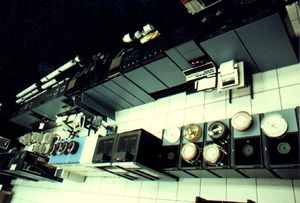Difference between revisions of "Foonly"
From Computer History Wiki
(Stub.) |
m (Fix Super Foonly link) |
||
| (13 intermediate revisions by 2 users not shown) | |||
| Line 1: | Line 1: | ||
| − | + | [[Image:F1.JPG|300px|right|thumb|The Foonly F-1]] | |
| − | {{stub}} | + | '''Foonly''' was a company which made [[PDP-10]] clones. |
| + | |||
| + | They made their own operating system, [[FOONEX]], for their machines; it was based on [[TENEX]]. | ||
| + | |||
| + | == Computer Models == | ||
| + | |||
| + | The F-1 was an ECL adaptation of the original [[Super Foonly]] design. The only one was built at [[Information International Inc|III]] for use in an optical character recognition system, and later was bought by Omnibus for generating computer graphics. | ||
| + | |||
| + | The F-2 was a small machine. Among other places, it was used at [[CCRMA]] (running WAITS) and Symbolics. | ||
| + | |||
| + | The F-3 and F-4 were popular with [[Tymshare]], which built their own versions. Tymeshare's System 26KL was an update of the F-4 design with [[KL10]] capabilities, intended to run [[Douglas Engelbart]]'s [[Augment]]. | ||
| + | |||
| + | The F-5 was another small machine. | ||
| + | |||
| + | [[Image:F2.jpg|300px|left|thumb|The Foonly F2]] | ||
| + | |||
| + | == Peripherals == | ||
| + | |||
| + | * The '''Foonly C1''' was a disk [[channel]] for [[Digital Equipment Corporation|DEC]] computers, compatible with [[International Business Machines|IBM]] drives. | ||
| + | |||
| + | == External links == | ||
| + | |||
| + | * [http://dave.zfxinc.net/f1.html Dave Sieg about the F-1] | ||
| + | * [http://www.bitsavers.org/bits/Foonly/F2/ Foonex monitor, microcode, and working microcode assembler] | ||
| + | * [http://www.bitsavers.org/pdf/sri/arc/augment_engine/26KL_Brochure_Oct83.pdf Tymshare's System 26KL] | ||
| + | |||
| + | {{semi-stub}} | ||
| + | |||
| + | [[Category: Computer Manufacturers]] | ||
| + | [[Category: PDP-10 Users]] | ||
Latest revision as of 15:51, 9 November 2024
Foonly was a company which made PDP-10 clones.
They made their own operating system, FOONEX, for their machines; it was based on TENEX.
Computer Models
The F-1 was an ECL adaptation of the original Super Foonly design. The only one was built at III for use in an optical character recognition system, and later was bought by Omnibus for generating computer graphics.
The F-2 was a small machine. Among other places, it was used at CCRMA (running WAITS) and Symbolics.
The F-3 and F-4 were popular with Tymshare, which built their own versions. Tymeshare's System 26KL was an update of the F-4 design with KL10 capabilities, intended to run Douglas Engelbart's Augment.
The F-5 was another small machine.

